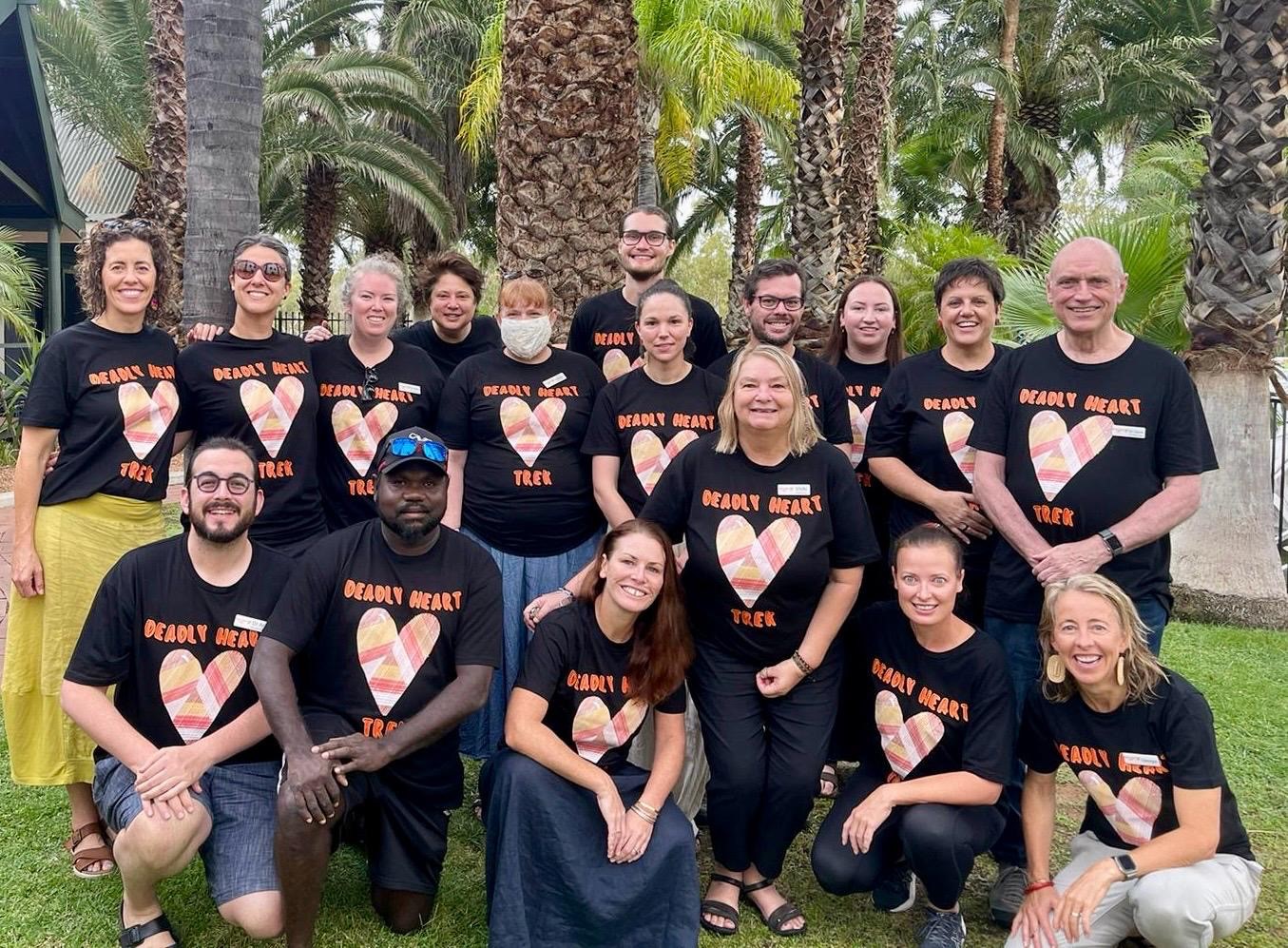
Aboriginal kids in Alice Springs have some of the highest rates of rheumatic heart disease (RHD) in Australia and possibly the world. The Deadly Heart Trek is excited to launch its fourth leg in Alice Springs, bringing together a coalition of paediatric cardiologists, multi-disciplinary doctors, Aboriginal cultural guides and health workers to address the critical health issue of RHD in Aboriginal and Torres Strait Islander communities.
Two teams of 10 have been invited back to Central Australia by community. They will visit 11 schools and several Town Camps in Alice Springs to listen, educate, treat and provide critical early diagnoses for Aboriginal children who can be affected by RHD, a condition disproportionately impacting Aboriginal and Torres Strait Islande people. The Trek team is supported by, and working with, the Central Australian Aboriginal Congress in Alice Springs – a primary health care service and leader in improving health outcomes for all Aboriginal people, as well as the local paediatric and cardiology staff from Alice Springs Hospital.
The teams will undertake a range of activities, including:
• Undertaking heart checks for children – echocardiographic (echo) screening to detect RHD
• Doing skin checks and promoting skin awareness – to understand skin sores, scabies and their link to RHD, and
• Undertaking education for the community, health workers and schools on RHD.
The Trek delivery team, known for their long-standing work within these communities, is also driven by First Nations leaders, like Vicki Wade, Noongar woman, Deadly Hearts Limited Board Co-Chair & Heart Foundation Aboriginal Lead.
“Aboriginal leadership and guidance underpin all we do. The Deadly Heart Trek is a culturally safe program with communities’ best interests at the centre. We listen to the traditional owners and community leaders,” Ms Wade said.
“This initiative is a journey of the heart. Right now, according to the Australian Institute of Health and Welfare around 10,000 First Nations people are living with RHD or with acute rheumatic fever, the precursor. If we don’t take serious steps to stop this disease, these numbers will likely double by 2031.
“RHD is not just a health issue; it is a clear indicator of the broader cultural, social, economic, and environmental issues in communities. Our focus is on RHD but holistically we are concentrating on the health of individuals and families, ensuring access to quality healthcare, and empowering communities with the resources and support needed to prevent and manage this disease.”
Paediatric Cardiologist and Deadly Hearts Limited Board Member Dr Gavin Wheaton said, “There is Aboriginal leadership, community demand and collective goodwill to end RHD. The Trek work is contributing to this. We’re returning to Central Australia as experts with a strengths-based approach to do incredibly positive work, together with the local health workers and schools, supplementing current services which are underfunded and under-resourced, improving access to health services and building community resilience and self-determination.”
Australia was a co-sponsor of the 2018 World Health Assembly’s international resolution to eliminate RHD. The cost of implementing the blueprint to end RHD – the Endgame Strategy – over the next decade is $689 million, according to the Telethon Kids Institute’s Centre of Research Excellence. Whilst the current Government commitment has increased, this must continue to grow.
To date the Trek has visited 36 communities across NT, QLD, and Central/APY Lands.
Positively, the majority of hearts were healthy from 2702 echo scans. However new cases of RHD were found and the burden on average is around 5%. The World Heart Federation considers a community where more than 0.1% of children have RHD, to be a high burden.
The Treks have been embraced by Indigenous communities and leaders and seen as positive action when shared at the World Congress on RHD in Abu Dhabi last year. Post-visit community surveys confirmed: 100% would welcome the Trek to return and 100% would recommend the Trek to other communities.
In addition to Vicki Wade, as Aboriginal cultural lead, other First Nation cultural guides for the Trek include Karen Iles – Dharug woman, Greg McAdam – Arrernte man, and Kellie Kerin – Arrernte woman & Registered Nurse.
“This Trek shows the importance of working with, and listening to, our people directly; to hearing a voice from the Centre, from the desert. I would love our people to have more of an understanding of RHD, taught in a way our mob learns. The Trek is an example of action that works for us, respects our rights, recognises our unique culture, and involves us directly,” Greg McAdam said.
The Snow Foundation CEO Georgina Byron said, “The Foundation has been contributing to empowering Indigenous communities for over a decade. We are thankful for this incredible group of health professionals, most of whom are volunteering their time, First Nations leaders, and the welcoming communities. We all have the same goal in mind, to end this preventable disease.”
The Snow Foundation, a philanthropic organisation, provides project management, logistics, community engagement, funding, and communications for the Deadly Heart Trek.